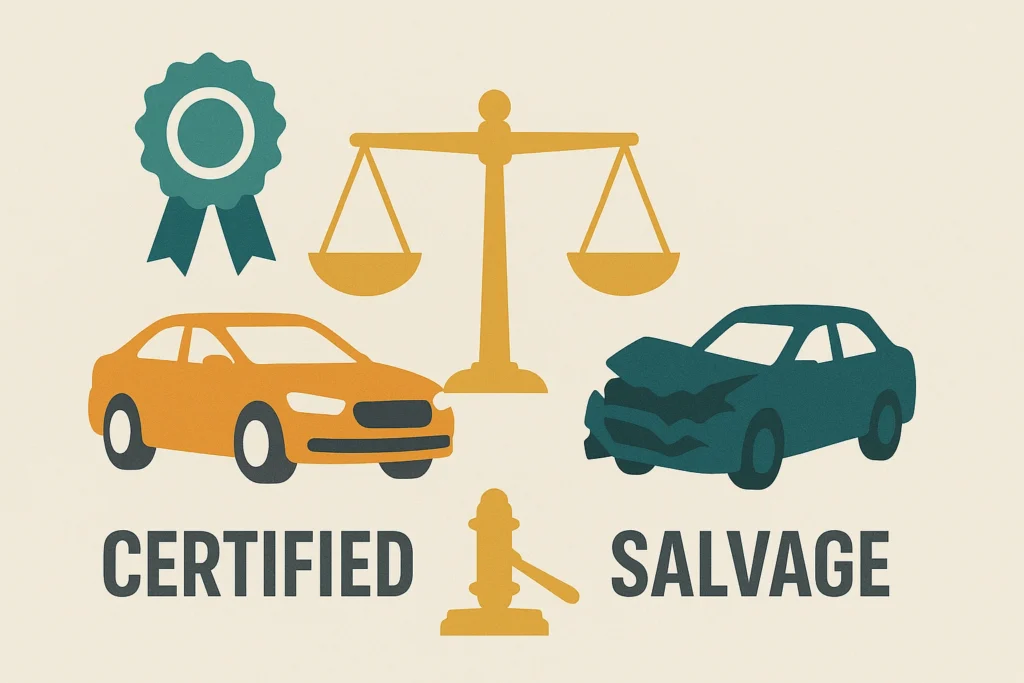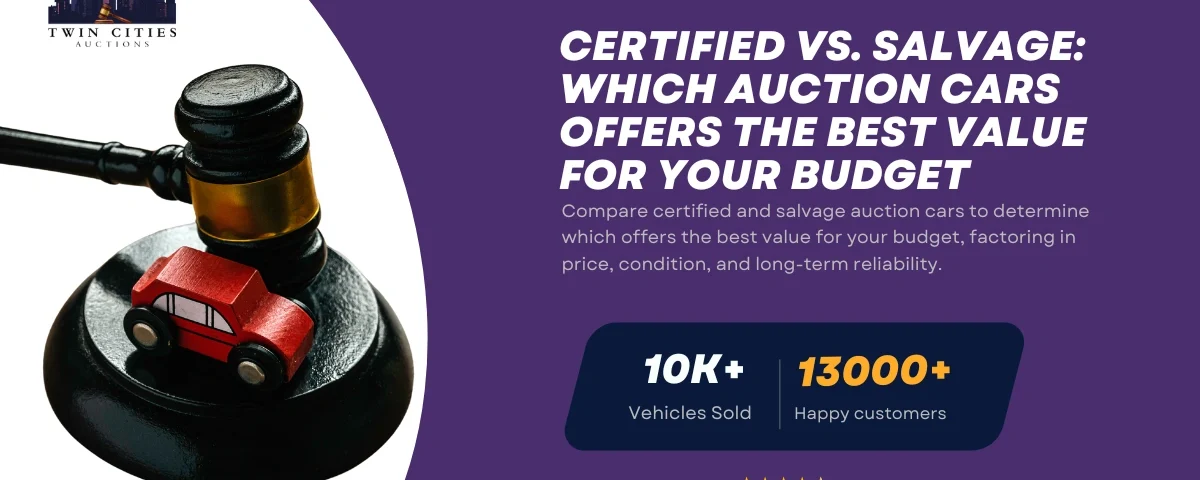When shopping auction lanes, you’ll often decide between Certified Pre-Owned (CPO) vehicles with manufacturer backing or salvage-titled cars offered at steep discounts.
Certified cars promise reliability and warranty coverage, while salvage cars can deliver exceptional bargains—if you’re prepared to handle repairs and paperwork.
This guide breaks down the features, costs, and risks of each option so you can choose the best value for your budget.

Key Takeaways
- CPO cars undergo 100–200-point inspections, include factory warranties, and offer roadside assistance
- Salvage titles flag total-loss vehicles; rebuilt titles follow documented repairs
- Buyers pay a 6–8% premium for CPO over comparable non-CPO vehicles
- Salvage cars sell with deep discounts but require out-of-pocket repairs and limited insurance
- Budget tiers guide when to favor salvage vs. certified for maximum value
- Inspect condition reports, verify title history, and plan post-sale inspections
What Are Certified Auction Cars?
Certified Pre-Owned vehicles at auction are late-model cars that meet manufacturer standards and receive:
- Multipoint Inspection: Often 100–200 checks covering engine, transmission, brakes, electronics, and cosmetics
- Factory-Backed Warranty: Powertrain and/or comprehensive coverage for an extended term
- Roadside Assistance: Towing and emergency services included for the warranty period
- Dealer Reconditioning: Repairs and parts replacement to meet “like-new” standards
- Detailed History Report: CARFAX® or AutoCheck® disclosures of accidents, service records, and title branding
| CPO Feature | Buyer Benefit |
| 100–200-point inspection | Confidence in mechanical soundness |
| Factory-backed warranty | Protection against major unexpected repairs |
| Roadside assistance | Coverage for towing and on-road emergencies |
| Detailed history report | Transparency into vehicle’s past |
According to Edmunds, buyers pay on average a 6–8% premium for three-year-old CPO vehicles compared to similar non-certified models—an investment in peace of mind and reduced repair risk .
What Are Salvage Auction Cars?
Salvage-titled vehicles have been declared total losses by insurers due to collision, flood, fire, or other damage. Key points include:
- Salvage Title Branding: State DMVs mark titles as “salvage” to prevent undisclosed returns to the road
- Rebuilt Titles: After completing repairs and passing a state-required safety inspection, vehicles may earn a “rebuilt” brand and clear the way for registration
- Condition Reports: Auctions provide damage grades and seller-reported details, but repair complexity can vary widely
- Insurance & Financing: Insurers often limit coverage to liability until a rebuilt title is issued; financing is rare without clean or rebuilt branding
| Title Type | Description | Buyer Tip |
| Salvage | Declared total loss; sold “as-is” | Budget for full inspection and repairs |
| Rebuilt | Repaired, inspected, retitled “rebuilt” | Verify inspection certificates |
Salvage cars can sell for 30–70% less than comparable clean-title vehicles, but you should account for repair costs, title-clearance fees, and any additional inspections.
Value Comparison: Certified vs. Salvage
When evaluating total cost of ownership, consider initial hammer price, ongoing repair or warranty costs, and eventual resale value. Certified cars often carry a higher purchase price but deliver lower out-of-pocket expenses over time. In contrast, salvage vehicles offer steep upfront savings at the expense of unpredictable repair bills and limited insurance options.
| Cost Component | Certified Car | Salvage Car |
| Hammer Price | Higher (CPO premium) | Lower (deep discount) |
| Repairs/Reconditioning | Minimal—covered by warranty | Potentially high—out-of-pocket |
| Warranty Coverage | Factory-backed | None until rebuilt |
| Resale Value | Strong—clean title | Weaker—rebuilt/salvage title |
| Insurance Options | Full coverage available | Liability only until rebuilt |
Key insight: If you plan to keep a vehicle long-term and value predictable expenses, CPO likely offers better total value. If you’re comfortable managing repairs and title work, a salvage vehicle can free up budget for customization or a higher trim level.
Maximizing Value at Different Budgets
Your optimal auction strategy shifts based on how much you’re willing to spend and how you plan to use the vehicle:
- Budget ≤ $5,000
Salvage vehicles dominate this tier. Look for solid-frame examples with clear VIN history. Plan for a pre-purchase inspection and set aside 10–20% of your total budget for repairs and title fees. - Budget $5,000–$15,000
A mix of CPO and higher-grade salvage makes sense. Choose CPO cars for reliable daily drivers and salvage for project or secondary vehicles. Compare estimated repair costs against CPO premiums to decide on each lot. - Budget > $15,000
Focus on Certified Pre-Owned vehicles to minimize downtime and financing hurdles. Warranty coverage and roadside assistance often justify the initial premium, especially for late-model or luxury brands.
Pro tip: Always calculate your maximum bid by adding buyer’s fees, transport, reconditioning/repair estimates, and title costs to the hammer price. This ensures you don’t overpay relative to your budget tier.
Tips for Safe Auction Buying
- Review Condition Reports: Examine damage codes, odometer entries, and flood indicators.
- Verify Title History: Use VINCheck or NMVTIS to confirm branding and lien status.
- Arrange Post-Sale Inspection: Hire an independent mechanic to assess mechanical and structural soundness.
- Confirm Warranty & Fees: With CPO, review the fine print on warranty coverage; with salvage, get clear invoices for repairs.
- Set a Strict Budget: Include hammer price, buyer fees, transport, repair estimates, and any title/registration charges.
Why Auctions Are a Smart Choice
When you’re building your inventory, using auctions can be a smart choice for sourcing vehicles. Twin Cities Auctions, based in Minnesota, is one such reputable auction house that offers a wide range of vehicles at competitive prices.
Key Benefits of Buying from Auctions:
- Wide Selection: Auctions like Twin Cities Auctions offer a variety of vehicles, from low-budget cars to high-end models.
- Competitive Pricing: Auctions often offer vehicles at prices below retail value, enabling dealers to maximize their profit margins.
- Transparency: Auctions provide full vehicle history reports, so you know exactly what you’re buying.
- Convenient Bidding: Many auctions offer online bidding for your convenience, making it easier to source vehicles without being physically present.
Twin Cities Auctions: A Smart Vehicle Sourcing Choice
For those in the automotive industry, Twin Cities Auctions offers an excellent platform for sourcing quality vehicles at competitive prices.
Whether you are just starting or expanding your business, this auction house provides transparency, competitive pricing, and a broad selection.
| Feature | Description |
| Inventory Variety | Wide range of cars, trucks, and SUVs available |
| Competitive Pricing | Below-market pricing allows for higher profit margins |
| Vehicle History Reports | Detailed history reports for every vehicle |
| Online Bidding | Convenient online bidding options for dealers |
| Financing Options | Financing available to help with inventory purchases |
Conclusion
Choosing between Certified Pre-Owned and salvage auction cars comes down to budget, risk tolerance, and mechanical readiness. CPO vehicles deliver reliability, warranty backing, and smoother financing at a premium.
Salvage-titled vehicles offer significant upfront savings for buyers prepared to tackle repairs and navigate title processes. By aligning your choice with your budget tier, doing your due diligence, and leveraging auction insights, you’ll drive away the best value for your dollar.
Public Auctions Made Easy with Twin Cities Auctions
At Twin Cities Auctions, we strive to simplify the public auction process for everyone. You don’t need a dealer license to buy or sell cars here. Our online auctions are designed to be user-friendly and open to the public, ensuring that individuals of all experience levels—from novice buyers to experienced sellers—can participate with ease.
With a focus on transparency and ease of use, we provide all the tools and support you need to confidently participate in the auction process. Start your car buying or selling journey with us today and experience how straightforward and effective our auction system can be!
Looking for more options? Explore our comprehensive list of all available car auctions across the United States. Your next deal might be just a click away!
FAQ
Can I finance a salvage auction car?
Most lenders require a clean or rebuilt title before offering traditional auto loans.
How long does a CPO warranty last?
CPO warranty terms vary by manufacturer but typically include 1–2 years or up to 100,000 miles of additional coverage.
Are rebuilt titles insurable?
Yes. Once vehicles pass rebuilt-title inspections, insurers generally offer liability and limited physical damage coverage.
What fees should I expect at auction?
Expect buyer’s premiums (commonly 5–7% of hammer price), transport, and any required repair or title fees.
How do I verify repair quality on salvage cars?
Obtain repair invoices, before/after photos, and arrange an independent post-sale inspection by a qualified mechanic.
Source Links
https://www.edmunds.com/car-buying/certified-pre-owned-cars-a-reality-check.html
https://www.edmunds.com/car-news/is-now-the-time-to-buy-sell-or-trade-in-a-used-car.html


